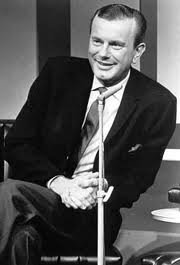
Jack Paar
RETURN TO INDEX |
Unknown

 |
American radio and
television comedian and talk
show host, best known for his stint as host of
The Tonight Show
from 1957 to 1962.
Drafted into the military
during WW2 and assigned to the
U.S.O. in the South Pacific to entertain the troops. |
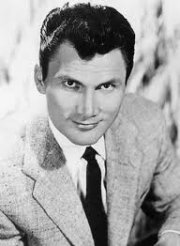
Jack Palance
RETURN TO INDEX |
U.S. Army Air Forces

 |
American film and television actor. During half a century of film
and television appearances he was nominated for three Academy Awards,
all as Best Actor in a Supporting Role, winning in 1991 for his role in
City Slickers. In 1957, Palance won an Emmy for best actor for
his portrayal of Mountain McClintock in the
Playhouse 90 production of Rod Serling's
Requiem for a Heavyweight. In the 1960s he released an album
of country-Western music for Warner Bros. Records. He hosted
Ripley's Believe It or Not! (1982 to 1986) on the American
ABC network. He made memorable appearances in
Young Guns (1988),
Tango & Cash (1989) and
Tim
Burton's
Batman (1989).
Served in WW2. His rugged face, which took many beatings in the
boxing ring, was said to have become disfigured while bailing out of a
burning B-24 Liberator bomber during a training flight over southern
Arizona, where he was a student pilot. Wounded in combat, he
received the purple heart, good conduct medal, and the WW2 Victory
Medal. |

Arnold Palmer
RETURN TO INDEX |
U.S. Coast Guard |
American
golfer who is generally regarded as one of the greatest players in
the history of men's
professional golf. He has won numerous events on both the
PGA Tour and
Champions Tour,
dating back to 1955.
Enlisted in the
Coast Guard, where he served for three years and had some time to
continue to hone his golf skills. |
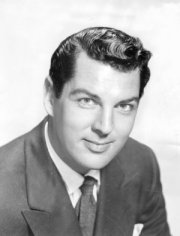
Byron Palmer
RETURN TO INDEX |
U.S. Army Air Force
 |
American stage and screen actor
and singer. Got his start working on both NBC and CBS radio as an
announcer and actor. After the war he performed on Broadway and
earned the 1949 Theatre World Award for his efforts. On TV he
hosted the program "Bride
and Groom" (1951). Made his large screen debut in the musical
bio Tonight We Sing
(1953), followd by Man in
the Attic (1953), Ma
and Pa Kettle at Waikiki (1955),
Glory (1956) and
Emergency Hospital
(1956). A one-time emcee for the "Miss Universe" and "Miss
International Beauty" pageants, he also showed up as a guest in episodes
of "Lawman" and "Perry Mason," among others, before he dropped off the
radar in the mid-1960s.
Served in WW2 II and operated a radio station on one of the islands in
the Pacific. He also performed with the Music Mates singing
quartet as its tenor. |
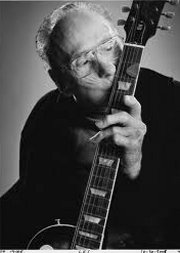
Les Paul
RETURN TO INDEX |
U.S. Army
 |
American jazz and country
guitarist, songwriter and inventor. He was a pioneer in the
development of the solid-body electric guitar which made the sound of
rock and roll possible. He is credited with many recording
innovations. Although he was not the first to use the technique,
his early experiments with overdubbing, also known as sound on sound,
delay effects such as tape delay, phasing effects and multitrack
recording were among the first to attract widespread attention.
Served in WW2. Drafted shortly after the beginning of the war
where he served in the Armed Forces Network, backing such artists as
Bing Crosby, the Andrews Sisters, and performing in his own right. |
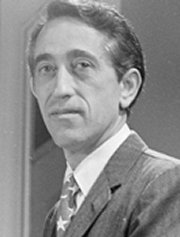
Pat Paulsen
RETURN TO INDEX |
U.S. Marine Corps
 |
American comedian and
satirist notable for his roles on several of the
Smothers Brothers TV shows, and for his campaigns for President of
the United States in 1968, 1972, 1980, 1988, 1992, and 1996, which had
primarily comedic rather than political objectives. After
attending San Francisco City College, Paulsen joined an acting group
called "The Ric-y-tic Players" and formed a comedy trio which included
his brother Lorin. He went on to become a single act in various
clubs on the west coast and in New York City. During one of his
appearances in San Francisco, he met the Smothers Brothers. Early
in 1970, Paulsen headlined his own series, Pat Paulsen's Half a Comedy
Hour, which ran 13 weeks on ABC. During later years, Paulsen
appeared in nightclubs, theaters, and conventions throughout the
country.
Served during WW2. |
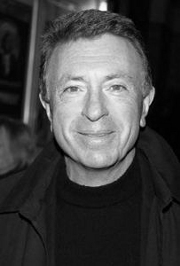
Leo Penn
RETURN TO INDEX |
U.S. Army Air Forces

 |
American actor and director and
father of musician Michael Penn and actors Sean Penn and the late Chris
Penn. In 1954, Penn won the Theatre World Award for his
performance in the play The Girl on the Via Flaminia. Later
he would find work as a television director for shows such as
Star Trek,
I Spy,
Starsky and Hutch,Custer,
St. Elsewhere,
Kojak,
Cagney & Lacey,
Columbo,
Trapper John, M.D. and
Father Murphy.
Served in WW2 as a B-24 Liberator bombardier with the 755th Bomb
Squadron, 458th Bomb Group, stationed in England as part of the Eighth
Air Force. |
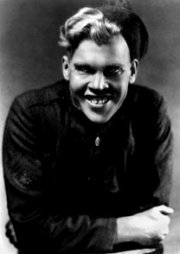
Jack Pennick
RETURN TO INDEX |
U.S. Marine Corps
& U.S. Navy




 |
American film actor.
After working as a gold miner as a young man, he appeared in over 140
films between 1926 and 1962. Pennick was a leading member of the
informal John Ford Stock Company, appearing in dozens of the director's
films. Pennick also drilled the military extras in John Wayne's
The Alamo (1960).
Served in WW1 and WW2. Joined the USMC and served with the Peking
Legation Guard in China in 1912. He was with the Marines in World
War I and reenlisted in the USN in 1942, at the age of 46. He served as
Chief Petty Officer under Commander John Ford in the Field Photographic
Unit and, according to Ford, was decorated with the Silver Star medal
for action in which he was wounded at Majaz al Bab, Tunisia. |
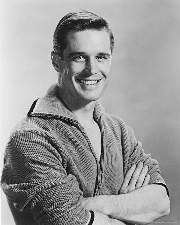
George Peppard
RETURN TO INDEX |
U.S. Marine Corps
 |
American film and television
actor. Secured a major role alongside Audrey Hepburn in
Breakfast at Tiffany's (1961). Played the title role in the
early-1970s television series
Banacek.
Probably best known for his role as Col. John "Hannibal" Smith in the
1980s television show
The
A-Team.
Enlisted at age 17 on July 8, 1946 and rose to rank of Corporal in the
10th Marines, leaving the Marines at the end of his enlistment in
January 1948. |
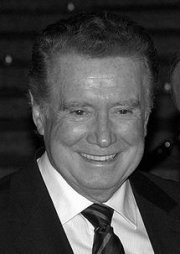
Regis Philbin
RETURN TO INDEX |
U.S. Navy |
American
media personality,
actor and
singer,
known for hosting
talk
and
game shows from the 1960s to the present. Philbin is often called
(somewhat
tongue-in-cheek and alternately attributed to
James Brown) "the
hardest working man in
show business"
and holds the
Guinness World Record for the most time spent in front of a
television camera. With each TV appearance, he adds to his
record for most hours logged (16,100, as certified by Guinness World
Records in 2008). His trademarks include his excited manner, his
New York
Bronx
accent, his
wit, and
irreverent
ad-libs. He is most widely known for
Live
with Regis and Kelly,
Who Wants to Be a Millionaire,
Million
Dollar Password, and for hosting the
first season of
America's
Got Talent.
Served as a Supply Officer in
the 1950s. |
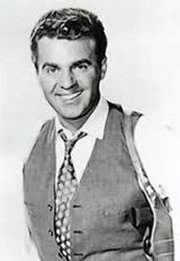
Paul Picerni
RETURN TO INDEX |
U.S. Army Air Forces


 |
American actor perhaps best
known for his role as Lee Hobson, from 1960 to 1963 on TV's
The Untouchables. As a young actor returning from the war, he
appeared in military picturesTwelve
O'Clock High (1949) and
To Hell and Back. He appeared in the pilot episode for the
1957 to 1958 NBC detective series,
Meet McGraw and in in two episodes, "Gun Hand" and "Badge to Kill"
of the 1957 to 1959 syndicated western series
26 Men.
In 1964, he portrayed Pierre Lafitte in,
The Great Adventure. For some 30 years, Picerni was the
half-time master of ceremonies for the
Los Angeles Rams home games.
Served in WW2 as a first lieutenant bombardier in the China-Burma-India
Theater. He flew 25 combat missions and received the Distinguished
Flying Cross. He was the bombardier on one of the planes which
attacked and destroyed the real bridge made famous in the film
The Bridge on the River Kwai (1957). After the Japanese
surrendered, Picerni became a Special Services officer in India. |
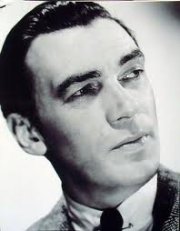
Walter Pidgeon
RETURN TO INDEX |
Royal Canadian Field
Artillery

 |
Canadian actor who lived
most of his adult life in the United States. He starred in many motion
pictures, including
Mrs. Miniver,
The
Bad and the Beautiful,
Forbidden Planet,
Advise and
Consent and
Funny Girl.
Served in WW1 in the 65th
Battery. |
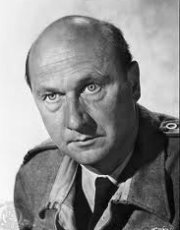
Donald Pleasence
RETURN TO INDEX |
Royal Air Force


 |
English actor who gained more than 200 screen credits during a career
which spanned over four decades. Often typecast as villainous
and/or psychopathic characters, Pleasence is arguably best-known for his
work in two of cinema's most successful franchises -
James Bond and
Halloween. The only actor to have appeared in both
The Great Escape
(1963) and its TV sequel,
The Great Escape II: The Untold Story (1988) (TV).
Was commissioned into the Royal Air Force, serving with 166 Squadron,
RAF Bomber Command. His
Avro Lancaster
was shot down on 31 August 1944 during a raid on Agenville. He was
taken prisoner and placed in a German prisoner-of-war camp, where he
produced and acted in plays. He would later play Flight Lt. Colin Blythe
in The Great Escape where much of the story takes place inside a German
POW camp. |
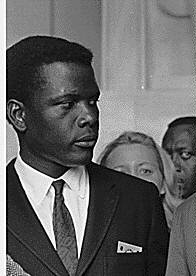
Sidney Poitier
RETURN TO INDEX |
U.S. Army |
Bahamian American actor, film director, author, and diplomat. In 1963, Poitier became the first black person to win an
Academy Award for Best Actor for his role in
Lilies of the Field. In 1999, the
American
Film Institute named Poitier among the
Greatest Male Stars of All Time, ranking 22nd on the list of 25.
Served in the late 1940s as a worker at a veteran's hospital. |
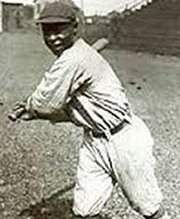
Spot Poles
RETURN TO INDEX |
U.S. Army

 |
American outfielder in
baseball's
Negro Leagues. He was generally recognized as one of the
fastest players of his day. He was a left-handed batter with a
noted eye, who hit for exceptionally high batting averages. He
started playing organized Negro ball for the Harrisburg Colored Giants
in 1906 and first became a professional for the Philadelphia Giants in
1909. Poles then moved to the New York Lincoln Giants in 1911,
where he blossomed into a star; in his first four seasons with the
Lincoln Giants, 1911 to 1914, Poles attained batting averages of .440,
.398, .414, and .487 against all levels of competition. He then
spent the next few seasons jumping among the New York Lincoln Stars,
Brooklyn Royal Giants, and the Hilldale Daisies. After the war he
continued a successful baseball career, playing for the Lincoln Giants
from 1919 to 1923. He is credited with a lifetime batting average
of over .400 against all competition, and hit .319 in four winters in
Cuba.
Served in WW1. Joined the
369th Infantry Regiment (Harlem Hellfighters) to serve, earning a
Purple Heart and the WW1 Victory Medal as a sergeant in France. |
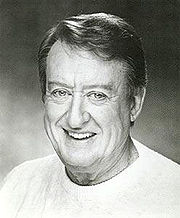
Tom Poston
RETURN TO INDEX |
U.S. Army Air Forces

 |
American television and film actor. He appeared as a comic actor, game show
panelist, comedy/variety show host, film actor, television actor, and
Broadway performer. In the 1950s, Poston gained recognition as a
comedic "Man in the Street" on the
Steve Allen Show. For these performances, Poston won the 1959
Emmy Award for Best Supporting Actor (Continuing Character) in a Comedy
Series. Poston was a recurring guest star on
The Bob
Newhart Show in the 1970s and played George Utley, bumbling country
handyman of the Stratford Inn, on
Newhart.
Served as a pilot in the
European Theater in WW2; his aircraft dropped paratroopers for the
Normandy invasion. He served in North Africa, Italy, France,
and England. |
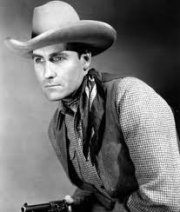
Lee Powell
RETURN TO INDEX |
U.S. Marine Corps

 |
Making his first appearance
uncredited in
Under Two Flags (1936), Powell gained fame for playing the suspect
who turned out to be
The
Lone Ranger and one of
The
Fighting Devil Dogs in 1938 serials. He also appeared in
Universal Pictures
Flash Gordon Conquers the Universe serial.
Enlisted on 17
August 1942 serving in the 2nd Pioneer Battalion, 18th Marine Regiment
of the 2nd Marine Division. Sergeant Powell fought in the
Battle of Tarawa
and Battle of
Saipan. Although widely reported to have been killed in action
against the enemy, he died of alcohol poisoning on Tinian as the result
of a concoction that also temporarily blinded another Marine. |
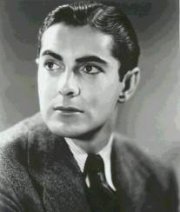
Tyrone Power
RETURN TO INDEX |
U.S. Marine Corps

 |
American film and
stage
actor who appeared in dozens of films from the 1930s to the 1950s, often
in swashbuckler
roles or romantic leads such as in
The Mark of Zorro,
Blood and Sand,
The Black Swan,
Prince of Foxes,
The Black Rose,
and
Captain from Castile.
Enlisted in August 1942 and
attended boot camp at
Marine Corps Recruit Depot San Diego and then attended
Officer's Candidate School at
Marine
Corps Base Quantico, where he was commissioned a
Second Lieutenant on June 2, 1943. Assigned to
VMR-352 as an
R5C transport copilot. The squadron moved to
Marine Corps Air Station El Toro in California in October 1944.
He was reassigned to VMR-353 and joined them on
Kwajalein in February 1945. He flew cargo in to and wounded
Marines out during the
Battle of Iwo
Jima and the
Battle of
Okinawa. |

Elvis Presley
RETURN TO INDEX |
U.S. Army |
One of the most popular American singers of the 20th century. A cultural
icon, he is widely known by the single name Elvis. He is often
referred to as the "King of Rock and Roll" or simply "the King".
He did much to establish early rock and roll music, bringing black blues
singing into the white, teenage mainstream. Teenage girls became
hysterical over his blatantly sexual gyrations, particularly the one
that got him nicknamed "Elvis the Pelvis". At the time of his
death, he had sold more than 600-million singles and albums. Elvis
made a comeback in the 1970s with live concert appearances starting in
early 1970 in Las Vegas with over 57 sold-out shows. Elvis toured
throughout the USA appearing on-stage in over 500 live appearances, many
of them sold out shows. Sadly, his marriage ended in
divorce, and the stress of constantly traveling as well as his
increasing weight gain and dependence upon stimulants and depressants
took their toll. Elvis Presley died on Tuesday, August 16, 1977 at his
mansion in Graceland, near Memphis at age 42. Since his death, his
Memphis home Graceland has become a shrine for millions of followers
worldwide. Elvis impersonators and purported sightings have become
stock subjects for humorists.
Served with
the 3rd Armored Division in
Friedberg, Germany from 1958 to 1960. |
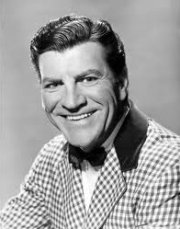
Robert
Preston
RETURN TO INDEX |
U.S. Army Air Forces

 |
American stage and film
actor. Preston appeared in many Hollywood
films,
predominantly
Westerns, but is probably best remembered for his portrayal of
"Professor" Harold Hill in
Meredith Willson's
musical
The Music Man (1962).
Served as an
intelligence
officer with the
U.S. 9th Air Force during WW2 in the European Theater. |
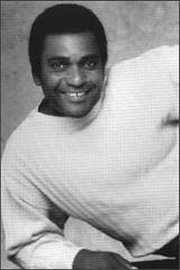
Charley Pride
RETURN TO INDEX |
U.S. Army |
American country music
singer. His smooth baritone voice was featured on thirty-nine
number-one hits on the Billboard Hot Country Songs charts.
His greatest success came in the early- to mid-1970s, when he became the
best-selling performer for RCA Records since Elvis Presley. In
1967, he became the first black performer to appear at the Grand Ole
Opry since DeFord Bailey. Between 1969 and 1971 Pride had eight
single records that simultaneously reached number one on the U.S.
Country Hit Parade and also charted on the Billboard Hot 100:
All I Have to Offer You (Is Me),
(I'm So) Afraid of Losing You Again,
I Can't Believe That You've Stopped Loving Me,
I'd Rather
Love You,
Is
Anybody Goin' to San Antone,
Wonder Could I Live There Anymore?,
I'm Just Me, and
his his biggest hit
Kiss an Angel Good Mornin', a million-selling crossover single that
helped Pride land the Country Music Association's prestigious
Entertainer of the Year award, as well as Top Male Vocalist. The pop success of these songs reflected the country/pop
crossover sound that was reaching Country music in the 1960s and
early 1970s, known as Countrypolitan.
Served two years in the mid-1950s. |
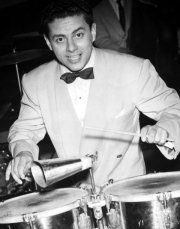
Tito Puente
RETURN TO INDEX |
U.S. Navy



 |
American Latin Jazz and Salsa
music musician. The son of native Puerto Ricans Ernest and Ercilia
Puente, of Spanish Harlem in New York City, Puente is often credited as
"El Rey de los Timbales" (The King of the timbales) and "The King of
Latin Music". He is best known for dance-oriented mambo and Latin jazz
compositions that helped keep his career going for 50 years. He
and his music appear in many films such as
The Mambo Kings and Fernando Trueba's
Calle
54. He guest starred on several television shows including
Sesame Street,
The Cosby Show and
The Simpsons.
Served in WW2. Joined in 1942 and was assigned to the escort
carrier USS Santee (CVE 29). He remained with Santee for the entire war
and fought in nine battles including,
Operation Torch
(the
British-American
invasion of French North Africa), The Palau, Yap, Ulithi, Woleai raids
in March and April 1944, Western New Guinea Operations April to
September 1944, the
Battle of
Leyte Gulf in October 1944, Okinawa Gunto Operation in March to June
1945, and Third Fleet operations against Japan in July 1945. Santee was
awarded the Presidential Unit Citation. He played the saxophone
and drums with the ship’s band. After the war he used the GI Bill to
attend the Julliard School of Music where he studied Musical Theory,
Orchestration and Conducting. |
|

